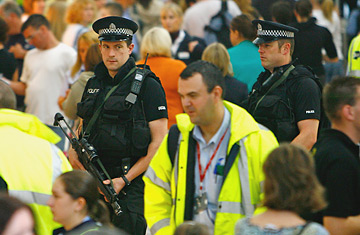
Armed police officers patrol Glasgow Airport in Scotland July 2, 2007.
Homeland Security chief Michael Chertoff's "gut feeling" that an al-Qaeda attack in the U.S. may be imminent is more than just a hunch — it echoes the prevailing sentiment among intelligence and counterterrorism officials in Europe.
Even before the recent failed attacks in London and Glasgow, Germany had raised its official terrorism-threat level after August Hanning, the country's top security official, compared the current situation to that which prevailed during the summer of 2001. "We are in a similar situation at the moment," Hanning told the German parliament. "We see there are active structures at work again. We received evidence that actions are planned in the region, but also in Europe and the U.S." A German official, asking not to be named , explained this week that the new assessment was based on the fact that "al-Qaeda has recovered the operational quality that it had in the past." Recent intelligence, he said, had tracked Islamists who had been based in Germany traveling to Pakistan and Afghanistan in recent months for training, and noted that these individuals were in communication with others back in Germany. (Two were arrested there last month.)
But like his U.S. counterpart, Hanning is referring to the general possibility of an attack rather than any specific threat, hoping to make Germans more alert to suspicious activities, and also raising pressure on any terror cells already in place. Says Rolf Tophoven, director of the Institute for Terrorism Research and Security Policy in Berlin, "Where there is no evidence, you must do things to shock terrorists in order to prevent them from acting."
In France, too, counterterrorism officials monitoring jihadist websites believe that the risk of an attack has risen since the election of President Nicolas Sarkozy, known to be closer to the U.S. and more supportive of Israel than his predecessor, Jacques Chirac. "The extremist websites and forums are buzzing with belligerent language calling for punishment of the supposedly pro-U.S., pro-Israel Sarkozy," says one French intelligence official. But others warn against overstating the Sarkozy factor, noting that France has always been a target of al-Qaeda and related jihadist groups, and that the election of Sarkozy — who inspired hostility in France's crumbling suburban ghettoes, and whose support for the U.S. and even the fact that he had a Jewish grandparent is cited in jihadist rants — is simply a useful propaganda ploy for jihadists seeking support.
Britain also sees a rising al-Qaeda threat, although it believes the latest attacks in London and Glasgow were more likely committed by relatively amateur groups inspired by al-Qaeda rather than by the network's own operational structures.
Although in recent years, terror experts had believed that the U.S.-led military ouster of the Taliban regime in Afghanistan had scattered al-Qaeda and forced it to assume a more decentralized form, there is now growing concern that Bin Laden's network has managed to regain its footing. "These groups feel somewhat freer to plot and plan along the Afghan-Pakistan border, where they have what amounts to a refuge," a senior U.S. counterterrorism official told TIME. Indeed, the central role of NATO in fighting the Taliban-Qaeda alliance in Afghanistan has also raised the incentive for the jihadists to strike at Germany, France and Britain. A recent jihadist video recorded on June 9 depicted a senior Taliban commander, Mansoor Dadullah, presiding over a "graduation ceremony" for some 300 would-be suicide bombers. Dadullah makes clear their targets will be in countries that have sent troops to Afghanistan: "These Americans, Canadians, British and Germans come here to Afghanistan from faraway places," he says on the video. "Why shouldn't we go after them?" One of the graduates told the camera, in English, that he was leading a squad on a suicide mission to Britain.
Although counterterrorism officials in the U.S. and Europe are careful to stress that there are no specific threats, they share the concern expressed by the senior U.S. official: "There is information, there are reports and other data coming in that shows these guys do mean to come after the U.S. But we do not have details of specific plots."
But raising the threat level in response to the possibility of attacks emanating from "al-Qaeda central" doesn't necessarily do much to limit the danger from homegrown imitators — the recent British attacks occurred even while Britain was on heightened standby. The London and Glasgow attempts, like another failed attack on trains in Germany last year, were notable for their comparative lack of sophistication. The suspects in London and Glasgow apparently got the know-how to make their bombs off the Internet, as did the two men who failed to detonate a bomb on a passenger train in Germany last year. So, even as the threat of a major professional attack emanating from al-Qaeda central may be on the rise, the danger from local amateurs acting autonomously remains ever-present. The limits on their technical expertise has helped Europe dodge a good few bloodbaths. But if al-Qaeda managed to get one of its Iraq-based bomb makers into Britain to service local cells such as the one that conducted the London and Glasgow attacks, the local-amateur circuit would become a whole lot more deadly.
—With reporting by Adam Zagorin/Washington and Bruce Crumley/Paris
